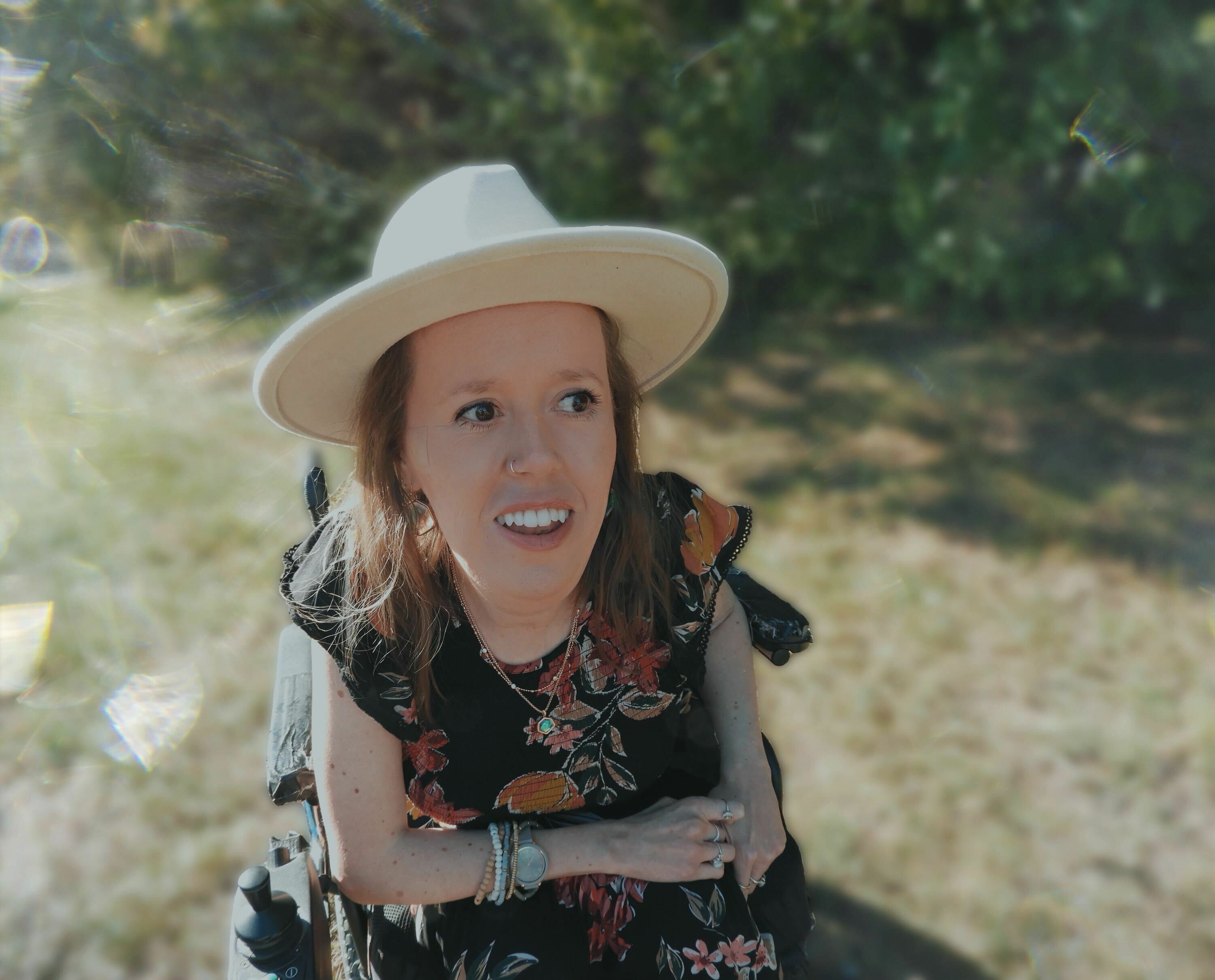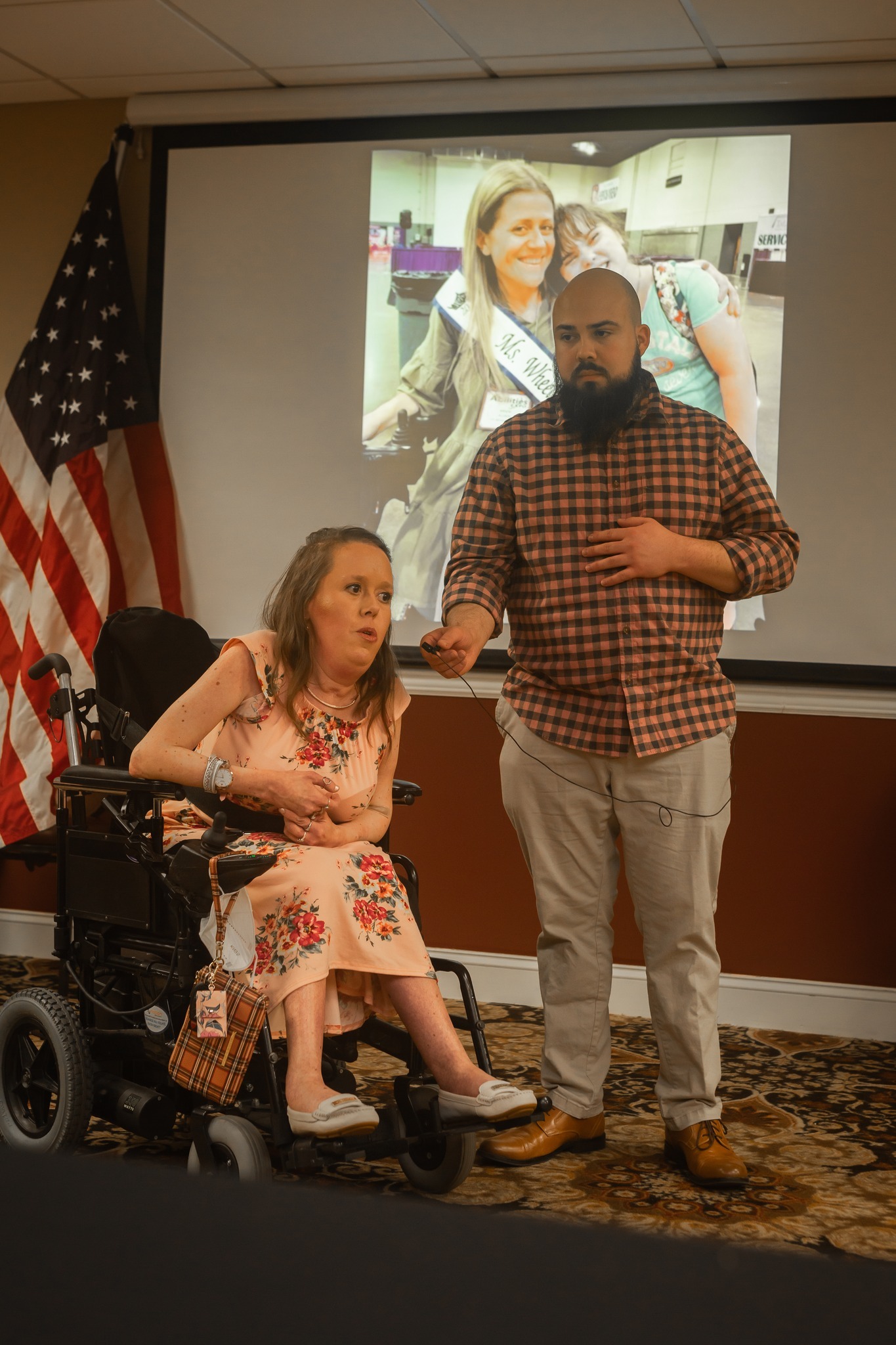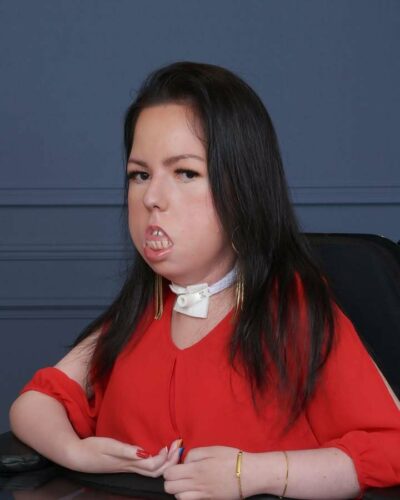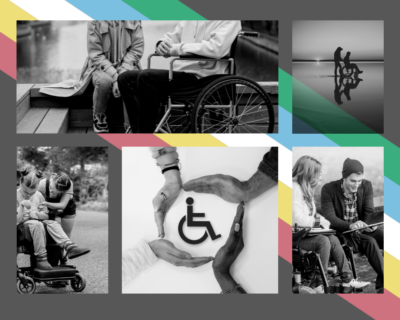Normalising Neuromuscular Bodies - Advocacy in Action
Every day the media is pushing the idea of a perfect person, a perfect body, but when you’re someone who doesn’t fit this mould, it can be a little bit disheartening. This is something that community member Kelly Berger knows all too well, using her confidence to help break down stereotypes through her work in Ms Wheelchair Ohio (USA) and as a disability advocate.
Every day the media is pushing the idea of a perfect person, a perfect body, but when you’re someone who doesn’t fit this mould, it can be a little bit disheartening. This is something that community member Kelly Berger knows all too well, using her confidence to help break down stereotypes through her work in Ms Wheelchair Ohio (USA) and as a disability advocate.
Kelly is in her mid-thirties and lives with an ultra-rare neuromuscular condition called Collagen 6, Congenital Muscular Dystrophy and is a mobility device user. Outside of being an advocate, she enjoys exploring and seeking adventure as an avid traveler, attending a concert any chance she gets as music, especially in live form, is something she’s really passionate about.
The Loop worked with Kelly to promote the world’s first Collagen 6 Day and sat down to talk about all things body positivity, inner confidence and disability advocacy.
We love that you entered Ms Wheelchair Ohio, a take on the traditional US beauty pageants. What inspired you to enter and what was the most empowering part of participating? What did you get out of it or learn from it?
I decided to enter my local Ms. Wheelchair Ohio competition because it had been something on my radar for a while and I decided it was time to take that leap and go for it. I wanted to challenge myself, continue to put myself out there and felt like this was a really good opportunity to immerse myself in getting practice in public speaking and networking, and meet fellow Ohio women in wheelchairs. The most empowering thing was finding a supportive sisterhood who "get you." They all live the disability lifestyle so they understand the struggles and the lived challenges that we face day-to-day. So, it was really awesome to gain some powerful women in the industry I can now call friends. I learned that public speaking is still something that scares me, but comes easier with practice, the more you do it, the more it becomes routine. It also helped boost my confidence in what all I can accomplish as a female wheelchair-user. That opportunities are there, you just gotta go after them and keep chasing.
When a person doesn’t have what is considered a “normal body” by society, inner confidence is so important. What does body confidence mean to you, particularly as someone living with a neuromuscular condition?
Body confidence to me is feeling good about yourself, owning your body and all that encompasses it.
We all as humans have our own insecurities, nobody is perfect and nobody's body is perfect.
There is so much pressure from the media and the comparison culture that robs us of joy and truly feeling comfortable in our own skin. I think body confidence comes from within. Feeling whole and truly accepting yourself fully, flaws and all. There comes an added element when living with a neuromuscular condition, we may have to utilize mobility devices or external breathing devices that might delay self-acceptance of these added elements. Although some may consider them eyesores, these specific devices allow us to move freely or breathe efficiently, so they are essential to our everyday well-being. Knowing the capabilities of the human body and just how powerful each of us are as individuals, is special and should be celebrated. Whether you rely on various equipment or not, owning it, rocking it, and it's all about how you carry yourself and your outlook on it all.

While you come across as confident (and we love it!) we all have our moments, so have there been moments when you struggled with confidence? How did you overcome them?
I would say my transition from walking to a full-time wheelchair user was something that was probably the hardest for me to come to terms with, but most of that was due to societal pressures of how I would be perceived. A lot of my peers didn't understand why I was getting weaker or why I would walk one day without my chair and then on outings be in my power wheelchair the whole time. So, I pushed myself to try to conform to what I thought would make me the most "normal". Looking back, I'm happy that I prolonged my abilities to walk, but now I wish I would have listened to my body more that was in pain and constantly getting injured from falls, that would have saved me a lot of trauma and avoided trips to the emergency rooms when I would collapse. There is no set "time" it takes for a person to accept their disability or full use of a mobility device, it's up to ourselves to fully embrace it, and honestly some people still never fully do, so it took me a couple years in my teens to come to the self-actualization that this is my future and reality and you can either embrace it, or be bitter and angry all the time. I chose to love myself, wheelchair and all and those that don't accept me/it, aren't for me anyway.
Why is the representation of disabled women in beauty and media important?
Like I mentioned earlier, the media and advertisements are easily filtered and altered to make you think that humans are supposed to look a certain way. These media representations rarely accurately feature disabled women. It's pivotal for young girls to see themselves in these ad campaigns, to know that they are beautiful too. Growing up, I never saw an ad with anyone that looked remotely close to myself. So, it was almost as if I didn't exist. Shaping young girls, our future, is so important to accurately portray realistic beauty standards that's reflective of everyone and everybody, disabled and all. So, those watching, consuming that media are feeling seen and know that it's ok to look like that too. They don't need to "fix" themselves or their bodies, they are perfect as they are.
What are some stereotypes or assumptions about people who use wheelchairs that you hope to challenge through your visibility? If a brand or media outlet wants to include more disability representation, what advice would you give them on doing it respectfully and meaningfully?
I think there's always been some backhanded comments or compliments that get said out there in public that are taken wrongfully and can have a negative effect. "She's so pretty...for a girl in a wheelchair". Like our chairs make us un-beautiful, diminishing our value or taking away from being or feeling attractive. Our mobility devices are just a small piece of us, we are people first and foremost and my disability doesn't define my beauty. I know some may think differently or prefer a disability first language, but I have always seen myself as a female who just so happens to use a chair to get around. It's a part of me, but it's not every part of me.
I hope I show that with my smile, confidence and achievements that speak for themselves, that a strong successful woman can look like a girl in a wheelchair.
The advice I would give for brands or outlets to include more disability representation is to do so with authenticity. Meaning, by incorporating someone who lives with a disability into their campaign. We want to uplift our fellow disabled models, actors, dancers, performers in general, just give us a chance! We are craving to see ourselves properly represented on the big screen, on a stage or in an ad campaign, be an ally by staying true to authentic disability representation and casting disabled creatives in those roles!
Tell us about your work at various patient advocacy non-profit organizations (NPO) and the impact you hope this has on the neuromuscular community.
I hope that with my work at various patient advocacy non-profit organizations showcases what's possible as a person living with a neuromuscular condition. Our limits and potential are unlimited if we work hard, challenge perceptions and not just tell, but show others what we're capable of. I hope that it motivates others to use their lived experience to their advantage and as their super power to go after great things in life.
Create real change, your voice matters, you are powerful, don't ever stop fighting for your needs and know that the disability community is here to support you in those roles.

The pressure of always being an advocate and educating people about what it’s like to have a disability can be tough. How do you balance the pressure to “represent” your community with simply being yourself?
It is a balance dance to "represent" my community in both a professional setting and in my personal life. I have the unique angle of living with a rare disease and working in the rare disease space, so although it's simply such a rewarding thing, it can also be exhausting to constantly be "on" and be the go-to representative face of that condition. Although the good outweigh the struggles, sometimes keeping things separate and learning when you need space, or breaks to give yourself some time to decompress has been helpful at achieving that balance of advocacy education and just leading my everyday life.
If you could send one message to your younger self, what would it be?
Give yourself more grace and listen to your body. I think I was really hard on myself in my earlier years. Looking back, I'm happy I really pushed myself, but I also think I could have taken things easier and not have overworked my body so much. Have more balance!
What’s next for you personally or in advocacy?
Just continuing my journey as a disabled female creative! Championing the fight in current rare disease and disability policy issues, always spreading awareness and trying to enact change for a brighter more equal future for us all.
Have advice, 'how to' guides or a story you want to share? We want to hear from you!
You can submit your story or guide via our form. Provided your content meets our content requirements, your post will be published by a Loop moderator to the Living Life section.
Share your story



Join the conversation